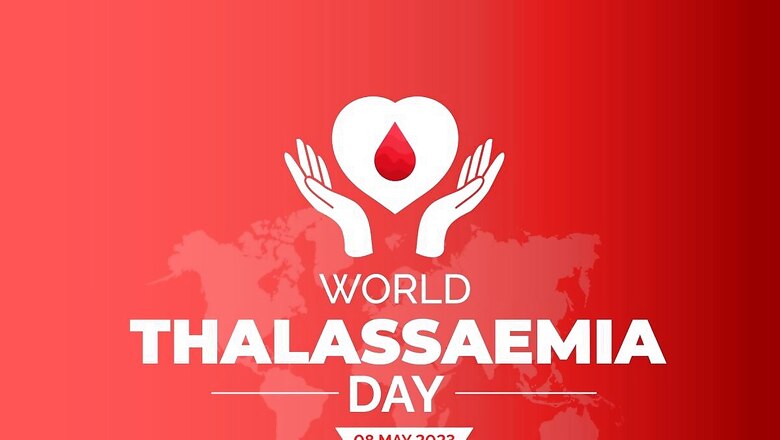
views
World Thalassemia Day is an important occasion to raise awareness about thalassemia, a genetic blood disorder that affects hemoglobin production in the body. Hemoglobin is the protein in red blood cells that carries oxygen to cells throughout the body.
Dr Priti Mehta, Consultant Paediatric Haematology, Oncology and BMT, SRCC Children’s Hospital, “Thalassemia, a genetic blood disorder, affects hemoglobin production, leading to varied symptoms like anemia and fatigue. Understanding its types—alpha and beta thalassemia—reveals the spectrum of severity. Symptoms for both alpha and beta thalassemia can range from mild to severe, requiring frequent blood transfusions.”
Thalassemia results from mutations in the genes that are responsible for producing hemoglobin. These mutations lead to abnormal hemoglobin production, causing anemia and other complications.
Dr Sunil Bhat, Vice-Chairman, Oncology Collegium, Narayana Health Group of Hospitals, adds, “Thalassemia manifests differently based on its types, affecting individuals with varied intensity. Alpha thalassemia often results in varied manifestations ranging from mild to severe symptoms, whereas beta thalassemia can lead to severe anemia and other complications. Understanding the genetic underpinnings of each type guides diagnosis and treatment strategies. While alpha Thalassemia is quite uncommon in India but beta thalassemia is pretty common and patients often rely on lifelong medical management, including blood transfusions and iron chelation therapy.”
There are several types of thalassemia, broadly categorized into alpha thalassemia and beta thalassemia, depending on which part of the hemoglobin molecule is affected:
Alpha Thalassemia
- Alpha Thalassemia Minor: This condition occurs when a person carries one mutated gene and one normal gene. Usually, there are mild or no symptoms.
- Alpha Thalassemia Intermedia: In this form, there are more severe symptoms due to mutations affecting two or three of the four alpha globin genes.
- Hemoglobin H Disease: This results from mutations affecting three out of four alpha globin genes. It leads to moderate to severe anemia and requires regular medical attention.
- Hydrops Fetalis (Alpha Thalassemia Major): This is the most severe form, where all four alpha globin genes are mutated. It is usually fatal for a fetus or newborn without proper medical interventions.Beta Thalassemia
- Beta Thalassemia Minor (Trait): People with this form carry one mutated beta globin gene and one normal gene. They usually have mild or no symptoms but may be carriers of the disease.
- Beta Thalassemia Major (Cooley’s Anemia): This is a severe form where both beta globin genes are mutated or absent. It leads to severe anemia, requiring lifelong transfusions and other medical interventions for survival.
- Beta Thalassemia Intermedia: This is an intermediate form between the minor and major types. Symptoms can vary widely but are less severe than beta thalassemia major.
Thalassemia is inherited in an autosomal recessive pattern, meaning that a child must inherit mutated genes from both parents to develop the severe forms of the disease. Carriers (those with one mutated gene) usually have no or mild symptoms but can pass the mutated gene to their children.
Prevention
Dr Bhat opines, “Prevention involves genetic testing and counselling, empowering families to make informed decisions about family planning. By addressing thalassemia comprehensively, from prevention to personalized care, we can improve outcomes and enhance the quality of life for affected people.”
Dr Mehta, shares, “Each type has distinct genetic mutations, influencing symptomatology. Prevention lies in genetic counseling, aiding families to make informed reproductive choices. Timely screenings during pregnancy provide valuable insights for early intervention.”
By raising awareness and promoting proactive healthcare measures we can prevent the birth of a child with Thalassemia. Early diagnosis and proper medical care can significantly improve the quality of life for individuals living with thalassemia. World Thalassemia Day aims to educate people about this condition, promote genetic testing, and support affected individuals and families.














Comments
0 comment